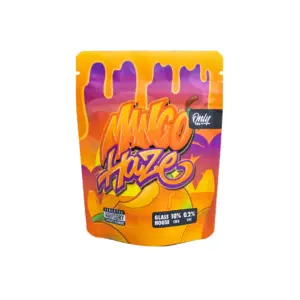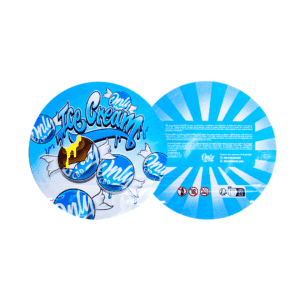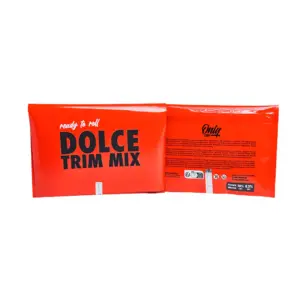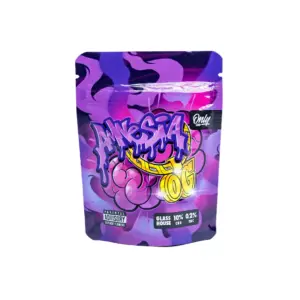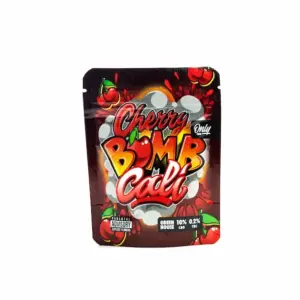HOW ARE THEY DIFFERENT?
Both CBG and CBD are non-intoxicating cannabinoids, but there are subtle differences between the two. Read on to learn everything you need to know about CBG and its potential unique benefits compared to CBD.
What is CBG?
Before we dive into the differences between CBG and CBD, let's first cover the basics of CBG.
Cannabigerol (CBG) is one of the first cannabinoids produced by the hemp plant. During the seedling stage, enzymes react with the plant's acids to create CBGA. CBGA is later converted into CBG through decarboxylation (heat). Dozens of other cannabinoids also begin to form during this stage.
Without going into details about scientific reactions and chemical structures, this means that without CBGA (and by extension CBG), other cannabinoids, such as CBD, would not exist. The conversion of plant acids into CBGA sets in motion a chemical chain reaction that gives rise to the more than 100 cannabinoids we know of today.
However, the reason you may not have heard of CBG, or seen it in products, is because the levels of this cannabinoid naturally produced within hemp are much lower than those of CBD (typically below 1%). Despite its elusive nature, CBG shows significant potential thanks to its versatile interaction with the body and mind.
What are the effects of CBG?
Research on the effects of CBG is still in its early stages, and much remains to be learned. However, thanks to the preclinical studies conducted to date, we know that CBG is nontoxic and appears to influence CB1 and CB2 receptors.
Since these receptors are distributed throughout the body, the potential impact on our physiology is significant. Currently, CBG research is focusing on:
• Glaucoma
• Inflammation
• Huntington's disease
• Drug-resistant bacteria
Researchers are very positive about the potential of CBG, and it is encouraging that more and more detailed and comprehensive studies are being conducted on the subject.
What are the differences between CBG and CBD?
Despite originating from similar chemical pathways, CBD differs from CBG in its chemical structure and concentration in hemp plants.
Chemical structure
CBG is produced when the extra carboxyl group is removed from CBGA through decarboxylation. When CBGA is exposed to heat, it transforms from a raw, acidic compound into an activated form (CBG). A similar process occurs with CBD, but in this case, the precursor compound is CBDA.
Pharmacology
To begin, let's look at the similarities between CBD and CBG. Both compounds lack intoxicating or psychotropic effects, so they're not dangerous and don't produce highs. And, although research is limited, the potential side effects of both cannabinoids appear mild.
However, if we look at its mechanism of action, several clear differences emerge. As we've mentioned, CBG interacts with CB1 and CB2 receptors, which is a significant difference from CBD.
CBD works by influencing the entire endocannabinoid system, rather than binding to specific cannabinoid receptors. It has some affinity for the CB2 receptor, but not to the same degree as CBG.
CBG, on the other hand, exhibits affinity for both types of receptors, giving it considerable potential. The brain has a large number of CB1 receptors, while the majority of CB2 receptors are found in the immune system.
Practicality
We've already mentioned the practicality of CBG, but it's worth highlighting again. Cannabigerol is estimated to only account for 1% of hemp's dry weight, making it much more difficult to isolate than CBD. In comparison, the CBD level in mature hemp plants is estimated to be approximately 10% (with a fairly considerable degree of variation).
Isolating CBG is not only difficult but also expensive. Producers require expert knowledge and state-of-the-art equipment to achieve concentrations close to those of traditional CBD products.
Full Spectrum CBD Oil
Full-spectrum products may benefit from the entourage effect, a unique phenomenon of chemical synergy between cannabinoids, terpenes, and other cannabis compounds. Essentially, the more compounds a formula contains, the more effective the product will be.
Choosing a full-spectrum CBD oil means you'll get a small portion of CBG's benefits, although not to the same extent as more dominant cannabinoids. Full-spectrum oils are a great introduction to CBG and the overall effect of cannabinoids on well-being.
CBD Oil Vs CBG Oil
With great precision, we've created formulas that include higher levels of CBG. Now you can experience its effects in both oil and isolate form.
Although our CBD oil contains traces of CBG, some CBG oils have much higher concentrations. But don't worry: both options are free of GMOs, additives, and unwanted chemicals, so you can try them with confidence.
Our 5% and 10% CBD oils focus on the potential of cannabidiol, along with CBG and other cannabinoids, to provide a comprehensive wellness boost.










